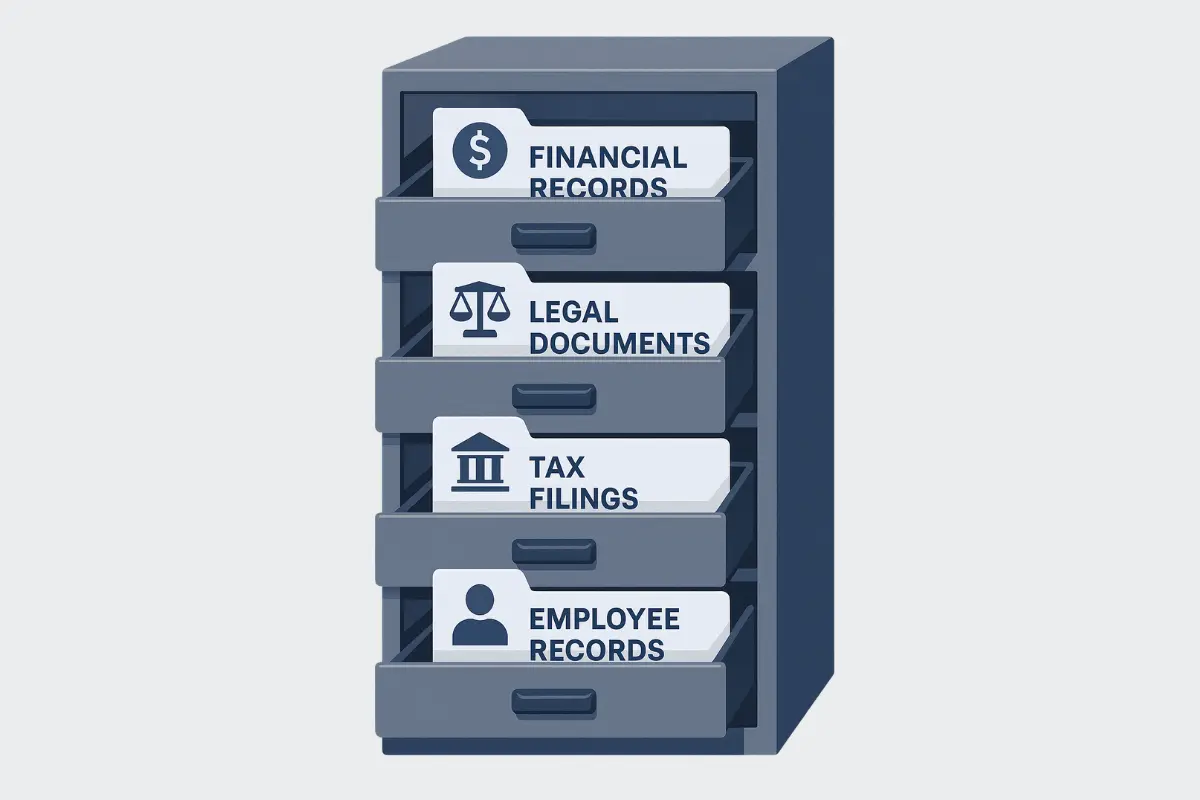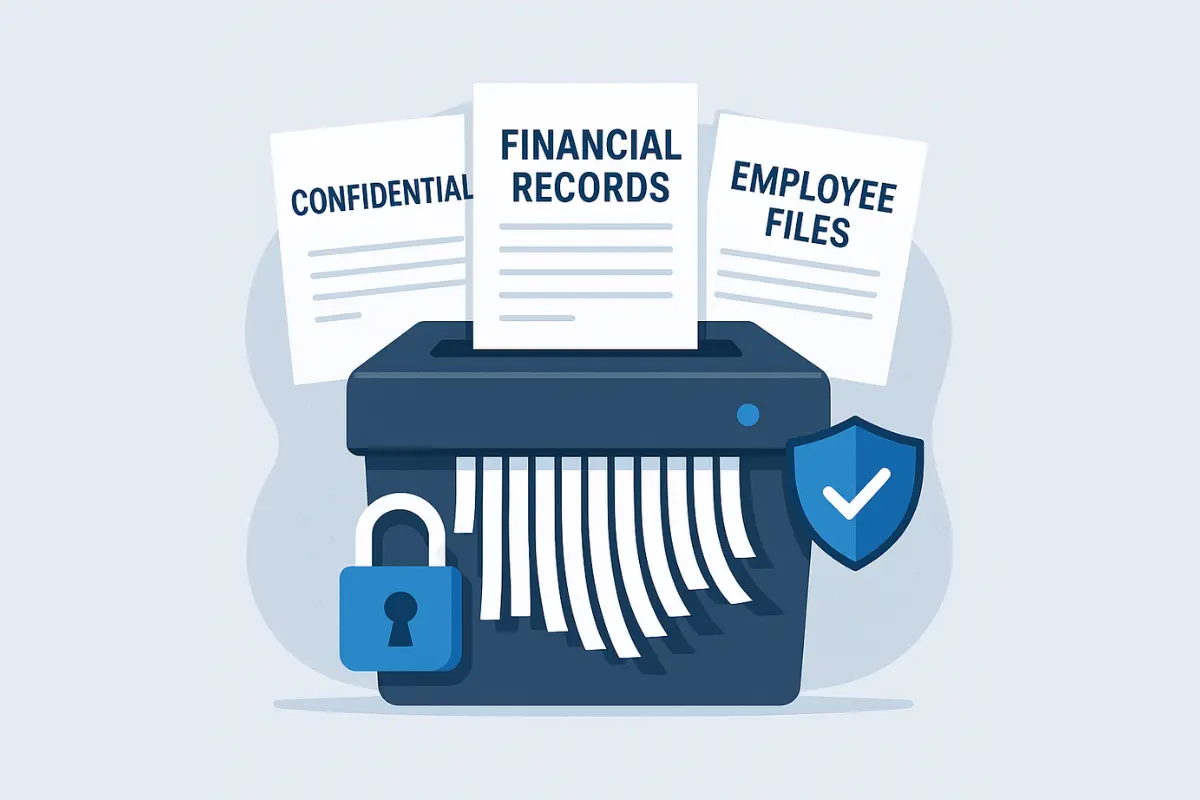Document Retention Guidelines for Small Businesses

Imagine this: after years of struggling, your small business is finally gaining momentum. Clients are booking weeks in advance, your calendar is packed, and your team is firing on all cylinders. The future is bright—until you get the dreaded notice: your business is being audited by the IRS. With receipts in shoeboxes and important documents buried in email threads, you scramble for paperwork, only to find key records missing. The result? Stress, lost deductions, and a costly penalty.
This isn’t just a nightmare scenario—it’s a reality for many businesses without a clear document retention strategy. Poor record retention practices can quietly expose your business to legal risks, compliance issues, and missed tax savings. Unlike large corporations with dedicated staff or extensive records management systems, small business owners often handle document retention and records management on their own, with limited space and time.
Federal record retention guidelines, along with state and local government requirements, are in place to help businesses maintain compliance and keep important documents accessible when needed. Understanding business record retention guidelines, knowing the correct retention periods for different documents, and implementing effective practices are essential steps for safeguarding your business against legal and financial setbacks.
This guide will explain to you exactly which documents to keep, how long to keep them, and why smart document retention practices are crucial for protecting your business and ensuring compliance. With the right approach, you can reduce stress, avoid costly mistakes, and keep your business running smoothly, even when the unexpected happens.
Key Takeaways
-
Clear document retention guidelines protect your business from legal and financial risks
-
Retain essential records—like tax returns, contracts, and incorporation documents—for the recommended periods or permanently
-
Secure, organized storage (digital, physical, or both) improves efficiency and reduces risk
-
Regularly review and update your retention policy to stay compliant with laws and industry standards
-
Proper disposal of outdated records safeguards sensitive information and supports compliance
Why Document Retention Matters for Small Businesses
Document retention guidelines serve as your business’s vital safety net. Whether facing audits, lawsuits, or regulatory inquiries, having well-organized records ensures smooth resolution instead of costly complications.
Effective records management is vital for businesses, supporting four critical functions: ensuring compliance with various agencies, preparing for potential audits, enhancing security against data breaches, and delivering cost savings through efficient organization.
Legal and Regulatory Compliance (IRS, SEC, HIPAA, etc.)
Multiple agencies require businesses to retain specific records for predetermined retention periods. The IRS generally recommends keeping tax-related documents for at least three years, though some situations—such as claiming a bad debt deduction or reporting a loss from worthless securities—require records to be kept for seven years. Employment tax records should be retained for at least four years after the tax is due or paid, whichever is later. Other federal agencies, such as the SEC or those enforcing HIPAA, may have different requirements depending on your industry.
Beyond simply meeting retention periods, businesses must also be mindful of how records are handled. Improperly altering, destroying, or concealing documents can have serious legal consequences. As the Minnesota Council of Nonprofits notes, "It is a crime to intentionally or knowingly alter, destroy, conceal, or falsify any record or document with intent to impede, obstruct, or influence a federal investigation or the administration of any other federal matter according to section 802 of SOX.”
Maintaining regulatory compliance, therefore, isn’t just about keeping documents for the right amount of time. It also means managing and protecting your records responsibly. Staying updated on changing regulations and practicing good records organization and management not only helps you meet legal obligations but also supports your business in audits, lawsuits, and regulatory inquiries.
Audit Preparation and Defense
A strong document retention policy ensures your business is always prepared for an audit—whether from the IRS, state agencies, or internal stakeholders. When you can easily access accurate, organized records, you can respond to requests quickly and confidently, reducing stress and minimizing disruption.
For example, a consulting firm once faced a Department of Labor audit over overtime payments. Because they maintained detailed payroll records and employment documents, they were able to promptly supply all requested information. As a result, the audit was resolved favorably within weeks, saving the business significant time, money, and potential legal trouble.
As SVA, a certified public accounting firm, notes, "If everything is neatly organized and easily accessible, the auditor can zip through their work. This not only saves time but also reduces the disruption to your daily operations."
Data Security and Risk Management
Organized document retention is essential for protecting sensitive information and minimizing business risk. By properly retaining and organizing sensitive documents, businesses can significantly reduce the risks of data breaches, identity theft, and accidental exposure. This means not only keeping records for the appropriate length of time but also ensuring both physical security—such as locked filing cabinets for paper documents—and strong digital security measures for electronic records, whether stored on local servers or in the cloud.
As Shelley Bougnague of Cloudficient, a company that helps businesses move their data securely to the cloud, notes, "Your data retention policy should include safeguards for preventing data breaches and unauthorized access."
By making secure document management part of your everyday business processes, you reduce the risk of costly breaches and regulatory violations.
Cost Savings and Storage Efficiency
Unnecessary document hoarding not only leads to clutter but also drives up storage costs—whether you're paying for physical filing space or digital storage capacity. Implementing a structured retention schedule helps prevent this accumulation, ensuring only essential records are kept and easily accessible when needed.
Leveraging digital document management solutions can further streamline storage by making it easier to organize, search, and retrieve files. Regularly disposing of outdated or unnecessary records—according to your retention policy—not only saves money on storage but also improves workflow by reducing time spent searching for information.
Types of Business Records You Should Retain
Business records fall into distinct categories, each serving different legal and operational purposes. These may include financial records, contracts, tax returns, and personnel files. Understanding these categories helps you organize your records management strategy effectively. Document retention guidelines can vary for certain types of records, whether physical or digital.
Retention periods are determined by legal requirements, business needs, and industry regulations. Some business records require permanent retention, while other documents can be safely disposed of after specific retention periods.

Financial Documents
Financial documents include tax returns, bank statements, payroll records, depreciation schedules, and canceled checks. These documents are used to prepare and verify your financial statements—such as the balance sheet, income statement, and cash flow statement—and are essential for audit defense.
As the IRS notes, "Good records will help you monitor the progress of your business, prepare your financial statements, identify sources of income, keep track of deductible expenses, keep track of your basis in property, prepare your tax returns, and support items reported on your tax returns."
To ensure compliance, it is important to determine how long to retain financial records based on legal and business requirements. Tax returns, bank statements, and depreciation schedules should generally be retained for seven years. Failing to maintain accurate financial documentation is one of the most common financial mistakes made by new businesses and can lead to further problems.
Legal & Corporate Documents
Legal and corporate documents—such as articles of incorporation, business licenses, contracts, NDAs, and board meeting minutes—form the foundation of your business's legal identity and authority. Most of these records, including incorporation papers and board minutes, should be retained permanently as proof of your business structure and compliance.
Meticulous documentation is not just about compliance; it also demonstrates strong governance and accountability. This is especially critical when attracting board members or investors, as well-maintained records provide transparency and instill confidence in your organization's leadership and decision-making.
Employment Records
Employee records include job advertisements, applications, payroll records, and termination files. Employers must retain these records to comply with federal and state laws, including the Americans with Disabilities Act. Proper retention of employment records protects businesses from discrimination claims and supports effective organizational management.
Retention periods for employee records vary by document type and state laws, so employers should regularly review legal requirements to ensure compliance.
Operational Records
Operational records include customer contracts, vendor agreements, inventory logs, schedules, and internal reports. These documents are essential for managing day-to-day business activities, ensuring smooth workflows, and maintaining accurate oversight of operations. Operational records are important whether you're running a traditional brick-and-mortar venture or starting a business online. Well-organized operational records also provide critical support during disputes and enable effective performance analysis, helping businesses identify trends, resolve issues, and make informed decisions.
How Long Should You Keep Business Documents?
Document retention periods aren't arbitrary—they're based on legal requirements and practical business needs. Retention periods may also vary depending on specific circumstances, such as industry regulations or audit concerns. Understanding these guidelines is essential for creating document retention policies that balance compliance with operational efficiency.
Keeping records for too long or too little can lead to compliance issues or unnecessary storage costs. The following sections break down recommended retention periods by document type to help you stay organized and compliant.
IRS Guidelines
The IRS provides specific guidance on retention periods for tax-related documents. Generally, businesses should retain tax returns and supporting documents for at least three years. However, the IRS specifies longer retention in certain situations. For example, "Keep records for 6 years if you do not report income that you should report, and it is more than 25% of the gross income shown on your return," according to IRS guidelines.
They also recommend keeping records for seven years if you file a claim for a loss from worthless securities or a bad debt deduction. If you file a fraudulent return or do not file a return at all, keep records indefinitely. Employment tax records should be retained for at least four years. For a more detailed breakdown of these requirements and best practices, you can consult a comprehensive tax record retention guide.
Employment and HR Records
Retention periods for employment and HR records depend on federal and state laws, as well as the type of specific documents involved. Under the Fair Labor Standards Act (FLSA), payroll records must be kept for at least three years, while the IRS recommends retaining employment tax records for at least four years after the tax becomes due or is paid. Other specific documents, such as job applications and personnel files, should generally be kept for one to three years after creation or termination, as required by the EEOC and other regulations. OSHA records must be kept for five years, and benefits or COBRA documentation for up to six years. Always check state laws, as some require longer retention periods.
Legal and Compliance Records
Certain legal and compliance records require long-term retention. Incorporation documents, property deeds, and key contracts should be kept permanently. Insurance policies should be retained for the duration of coverage plus several years to address any potential claims. Licenses and permits should be kept for as long as they are active and for a period after expiration as required by law.
General Retention Timeline Table
| Document Type | Retention Period | Compliance Notes |
|---|---|---|
| Tax Returns | 7 years | IRS guidelines |
| Payroll Records | 4 years | IRS/Federal compliance |
| Employee Files | 3–7 years after termination | Varies by specific document and state law; keep longer if litigation is possible |
| Bank Statements | 7 years | Audit/tax support |
| Business Licenses | Permanently | Legal requirement; proof of authorization |
Digital vs. Physical Document Storage
When deciding how to manage their important files, many small businesses weigh the pros and cons of digital vs. physical document storage. Digital storage offers easy search, remote access, and long-term cost savings, but requires reliable backups and initial setup. Physical storage provides security for sensitive or original documents, though it takes up space and limits accessibility. Many organizations adopt a hybrid approach, combining digital solutions for convenience and collaboration with secure physical storage for key originals.
How to Create a Document Retention Policy for Your Business
Developing a document retention policy starts by identifying the types of records your business handles and setting retention periods based on legal and operational needs. Choose storage solutions—digital, physical, or hybrid—that fit your organization. Assign employees to oversee implementation and schedule periodic reviews. Tailor your policy to your business's unique requirements, document it clearly, and train staff to ensure consistent compliance.
How to Properly Dispose of Business Documents
Proper document destruction is as important as retention. Shredding paper files and permanently deleting digital records helps prevent data breaches and legal issues. Always follow data protection regulations when disposing of sensitive information.
Shredding and Secure Disposal
Physical documents with confidential information, such as financial records and employee data, should be destroyed securely. Cross-cut shredding offers strong protection, while professional shredding services are ideal for handling large volumes and provide certified destruction. For in-house shredding, always follow best practices to ensure sensitive data is fully destroyed.

Data Wiping and Digital Document Deletion
Digital documents should be permanently deleted using secure data-wiping software, such as DBAN or other eraser tools. When clearing cloud storage, make sure files are removed from all backups and confirm data cannot be recovered. Always verify that digital media is fully wiped before disposal.
What Happens If You Don't Dispose Properly?
Improper disposal can lead to serious consequences. Data breaches from discarded documents may result in hefty fines under laws like GDPR or HIPAA, along with lawsuits from affected customers. Failing to comply with disposal regulations exposes your business to further legal and financial risks.
Conclusion: Stay Organized, Stay Compliant
Actionable Next Steps
-
Identify your key documents: Know what records you create and receive
-
Set clear retention periods: Base these on legal guidelines and business needs
-
Choose the right storage: Decide if digital, physical, or a mix is best for your business
-
Assign responsibility: Make sure someone oversees document management and disposal
-
Implement secure disposal: Shred sensitive paper files and use data-wiping tools for digital records
-
Document your policy and train your team: Keep everyone informed and accountable
-
Review regularly: Update your policy as relevant laws or your business change
With a solid document retention strategy, you'll not only safeguard sensitive information but also position your business for smoother operations and future growth.
FAQs
What is the best way to store sensitive business documents?
The best approach is a combination of secure physical and digital storage. Keep physical documents in locked, access-controlled areas such as safes or secure filing cabinets. For digital documents, use encrypted storage solutions, strong password protection, and enable multi-factor authentication. Regularly back up data and limit access to only those who need it.
Are there any documents that I should keep indefinitely?
Yes, some business documents should be kept indefinitely. These include incorporation documents, articles of organization, property deeds, bylaws, shareholder records, major contracts, patents, trademarks, and other records that establish your business's legal identity and ownership structure. Keeping these documents permanently ensures you can prove ownership, defend your business in legal matters, and comply with regulatory requirements. Always consult with your accountant or attorney for guidance specific to your industry and location.
How can I ensure my business stays compliant with document retention regulations?
To ensure your business stays compliant with document retention regulations, regularly review and update your retention policy to reflect current laws, industry standards, and any changes in your business operations. Stay informed about relevant legal updates, consult professionals as needed, and train your team on proper procedures. Periodic audits and updates will help maintain compliance and minimize risk.
What happens if I don't follow document retention guidelines?
If you don't follow document retention guidelines, your business could face regulatory fines, audit penalties, and a higher risk of data breaches or lawsuits. Staying compliant not only protects your business from legal and financial consequences but also shows a commitment to responsible management and builds trust with clients and partners.
Protect Your Business with a Smarter Retention Strategy
Don't let poor records management put your business at risk. Establishing clear document retention guidelines not only safeguards your company from legal issues but also streamlines your everyday operations.
At InCorp, we help small businesses navigate compliance and risk management challenges. Our team offers practical guidance to support your retention policies and keep your business audit-ready.
Contact us today and find out how InCorp can help your business stay organized, compliant, and focused on what matters most—your business's success.
Share This Article:
Stay in the know!
Join our newsletter for special offers.